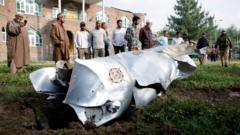As the Pakistani government accelerates the expulsion of undocumented Afghans, reports indicate that over 80,000 individuals have already left the country this month, with dire implications for those fleeing conflict and persecution.
Pakistan's Massive Deportation of Afghan Refugees: Over 19,500 Expelled This Month

Pakistan's Massive Deportation of Afghan Refugees: Over 19,500 Expelled This Month
The ongoing expulsion of Afghan refugees by Pakistan has raised significant humanitarian concerns as over 19,500 have been deported just this month.
Pakistan has recently intensified its efforts to deport undocumented Afghan nationals and those with temporary residency, citing the challenges of accommodating the growing number of refugees. According to the United Nations, more than 80,000 Afghans have departed in April alone as the country approaches a deadline set for the end of the month. Reports suggest that between 700 and 800 families are being sent back daily, sparking fears that up to two million Afghans may face deportation in the coming months.
Pakistan's Foreign Minister Ishaq Dar visited Kabul for discussions with Taliban officials, where concerns over the mass deportations were aired by his counterpart Amir Khan Muttaqi. Afghan returnees at the border shared heartbreaking stories of being forced back to a country they may never have seen or where they have no ties. Many claim they have lived their entire lives in Pakistan, often expressing fears for their children's future, particularly regarding education, as Taliban rules limit schooling for girls above a certain age.
While Pakistan has provided refuge to millions fleeing decades of conflict, officials now argue that current numbers pose significant threats to national security and public services. Already home to over 3.5 million Afghans, the country is grappling with the humanitarian implications of these deportations, with clashes reported at the border amid rising security tensions.
At the Torkham border crossing, conditions for deportees are dire. Individuals and families, some elderly or incapacitated, are assisted across under the watch of guards. As they await transportation back to their home provinces, many are struggling to cope with the harsh conditions and limited resources. Reports indicate that families often arrive with little more than the clothes on their backs, with many voicing frustrations over restrictions preventing them from bringing basic household items along.
The influx of returnees adds strain on an already fragile infrastructure in Afghanistan, where the economy is faltering and the population faces mounting pressure. Local authorities acknowledged that while they are addressing many concerns, the sheer volume of newcomers brings inherent challenges.
According to Hedayatullah Yad Shinwari, a finance committee member in the Taliban administration, returnees receive limited financial assistance from Kabul, making it even more challenging for families attempting to resettle. Many express a sense of hopelessness and loss, leaving behind lives they built over decades in Pakistan only to face an uncertain future in their homeland.





















